 Drummer Ted Sirota and his band Rebel Souls have a new record out called Seize the Time (Naim Jazz, 2009). It’s an explicitly political instrumental album, very in line with Sirota’s previous CDs, all of which have featured album titles, song titles and liner notes that make clear Sirota’s progressive politics.
Drummer Ted Sirota and his band Rebel Souls have a new record out called Seize the Time (Naim Jazz, 2009). It’s an explicitly political instrumental album, very in line with Sirota’s previous CDs, all of which have featured album titles, song titles and liner notes that make clear Sirota’s progressive politics.
I talked with Sirota about Seize the Time for my show, The Jazz Session. (That interview will air later this year.) During the interview, Sirota mentioned that he believes many critics ignore or dismiss — or simply miss — his music, instead talking about his politics and nothing else. His comment, coming as it did 25 minutes into an interview where I’d done nothing but talk about his politics, initially made me regret the direction of the conversation up to that point.
After a few moments’ thought, though, I told Sirota that while I think the album is powerful musically, I think it’s even more powerful socially because we live in an age where explicit political statements are vital to our survival. I’m happy to have another CD of smart, fun music to listen to. I’m even happier to turn people on to an artist who puts his social awareness where his drumsticks are.
In the 1960s, jazz artists made socially aware music, much as their counterparts in other genres did. I’ll give some specific examples in a minute. To be fair, such music has never completely disappeared, although “conscious jazz,” to coin a term, has ebbed and flowed in the same way as political engagement in this country.
When I think of conscious jazz, a few names instantly spring to mind: Max Roach, Abbey Lincoln, Charles Mingus and Charlie Haden are some of the big ones from the 50s through the 70s. Of more recent vintage, a standout example is In What Language? by Vijay Iyer and Mike Ladd , a brilliant and scathing critique of immigration and racial politics in post-9/11 America.
Here are several records and songs that took a stand. Please note that this list is nowhere near exhaustive. (It’s just a starting place for exploration.
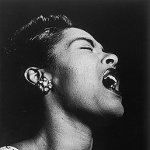 Billie Holiday, ”Strange Fruit”
Billie Holiday, ”Strange Fruit”
This is perhaps one of the most daring performances of its era. The lyrics by Abel Meeropol are an unsparing and disturbing response to white-on-black violence in the American apartheid era. The titular fruit is in fact lynched black bodies hanging from Southern trees. For a black woman to perform this song in 1939 was an incredible act of courage. Sadly, it would still take courage now.
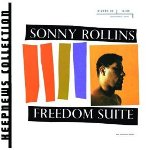 Sonny Rollins, Freedom Suite (Riverside, 1958)
Sonny Rollins, Freedom Suite (Riverside, 1958)
”How ironic that the Negro, who more than any other people can claim America’s culture as his own, is being persecuted and repressed; that the Negro, who has exemplified the humanities in his very existence, is being rewarded with inhumanity.” So wrote the saxophone colossus, Sonny Rollins, in the liner notes of this seminal saxophone trio recording. Aiding Rollins on this record was another outspoken jazz master, drummer Max Roach. (Sonny Rollins joined me on The Jazz Session on Election Day 2008 to talk about Barack Obama, race relations and environmentalism. Listen to the show.)
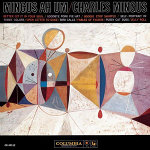 Charles Mingus, ”Fables of Faubus”
Charles Mingus, ”Fables of Faubus”
The Mingus catalog contains quite a few overtly political numbers, but this one is probably the most famous. Mingus wrote it to protest the racist governor of Arkansas, Orville Faubus, who used the National Guard to stop the integration of Little Rock Central High School in 1957. This song appears on what I’m going to go right ahead and call one of the greatest albums of all time: Mingus Ah Um (Columbia, 1959). The long-standing legend is that Mingus wrote lyrics to the tune but Columbia prevented him from recording them. In later years, it has been suggested (in liner notes and elsewhere) that Mingus penned the lyrics after the song had already been recorded. In any case, Mingus re-recorded it a year later with lyrics for the album Charles Mingus Presents Charles Mingus (Candid, 1960). (Other Mingus song titles of note: ”Free Cell Block F, ‘Tis Nazi U.S.A.” and ”Oh Lord, Don’t Let Them Drop That Atomic Bomb On Me.”)
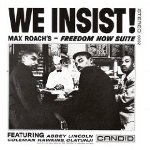 Max Roach, We Insist! – Freedom Now (Candid Records, 1960)
Max Roach, We Insist! – Freedom Now (Candid Records, 1960)
Roach collaborated with Oscar Brown, Jr. for this 1960 recording, released at the same time and on the same label as the second Mingus album mentioned above. Abbey Lincoln sings several of the songs with Brown’s lyrics, including “Driva Man” and “Freedom Day.” The album also looks abroad on “Tears for Johannesburg.” Even the cover references the struggle with its sit-in photo.
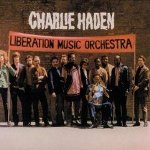 Charlie Haden, Liberation Music Orchestra (Impulse! Records, 1969)
Charlie Haden, Liberation Music Orchestra (Impulse! Records, 1969)
Haden, known for his sideman work with Ornette Coleman, came out swinging on his 1969 Impulse! Debut, Liberation Music Orchestra. The album contains songs from the Spanish Civil War, original compositions by Haden, Coleman and Carla Bley, and a programmatic piece called ”Circus ’68 ’69” that was inspired by the chaos at the 1968 Democratic Convention in Chicago. (The Liberation Music Orchestra returns from time to time when things are at their worst. The band released Ballad Of The Fallen during the Reagan era, and Not In Our Name during W’s reign of terror.)
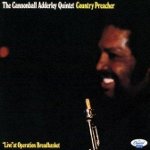 Julian ”Cannonball” Adderley Quintet, Country Preacher (Capitol Records, 1969)
Julian ”Cannonball” Adderley Quintet, Country Preacher (Capitol Records, 1969)
This album’s title track is Joe Zawinul’s tribute to Jesse Jackson. Jackson himself introduces the album, which was recorded live at Operation Breadbasket in Chicago. Operation Breadbasket was part of Martin Luther King, Jr.’s Southern Christian Leadership Conference, and its aim was to better the economic standing of black communities. Jesse Jackson led the Chicago branch.
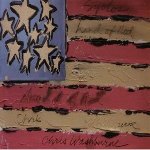 Chris Washburne & The SYOTOS Band, Land of Nod (Jazzheads, 2006)
Chris Washburne & The SYOTOS Band, Land of Nod (Jazzheads, 2006)
Trombonist Chris Washburne and his latin jazz band SYOTOS recorded this album during the long national nightmare of W. In his liner notes, Washburne wonders whether we were all ”just asleep” (hence the title), and he uses the album’s cover art effectively, too, with its depiction of a washed-out American flag. And song titles such as ”Guantanamo” don’t leave much to the imagination.
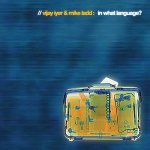 Vijay Iyer and Mike Ladd, In What Language? (Pi Recordings, 2003)
Vijay Iyer and Mike Ladd, In What Language? (Pi Recordings, 2003)
This album uses a broad musical palette to tell stories of racism, profiling, immigration and misunderstanding. Mike Ladd’s lyrics and MC talents combine with Iyer’s daring and multifaceted music. For many American listeners, this album will provide an uncommon insight into the South Asian experience in this country. A must-hear.

![Reblog this post [with Zemanta]](http://img.zemanta.com/reblog_e.png?x-id=2db2ec54-606f-4059-b120-5adc94bc6af7)



Comments